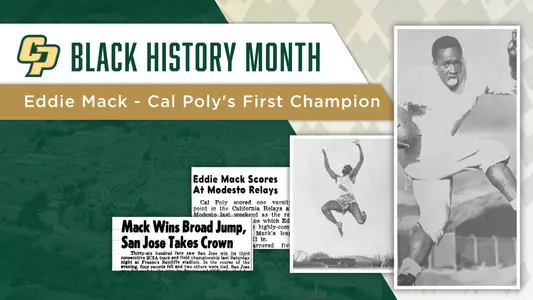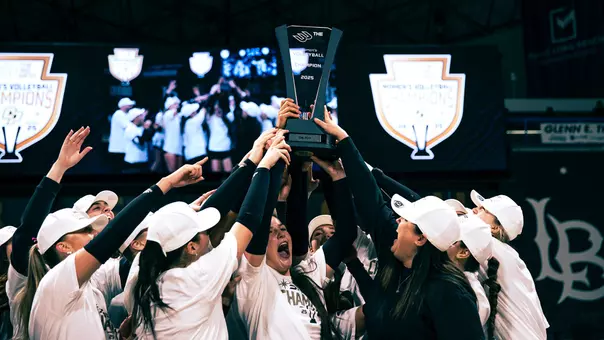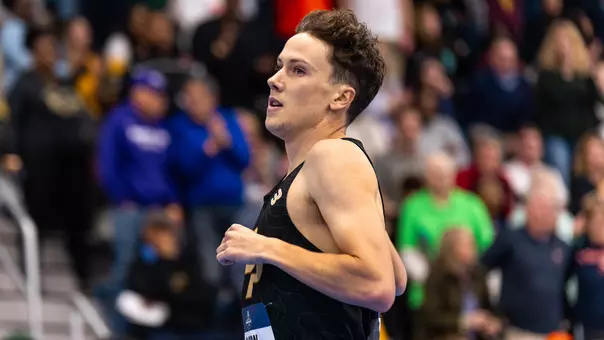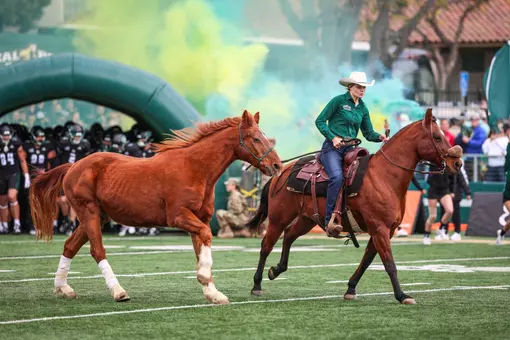
Eddie Mack: Cal Poly's First Champion
2/11/2021 9:28:00 AM | General, Track and Field
Although the Mustangs fielded competitive squads in track & field for the program's first few intercollegiate seasons following World War II, Cal Poly hadn't yet claimed any conference titles in the sport.
That all changed in the spring of 1949, though, thanks to Eddie Mack.
In his debut season with the Mustangs, Mack won the program's first-ever individual championship in any event, taking the 1949 California Collegiate Athletic Association long jump title (then referred to as the "broad jump"), with a victorious mark of 23 feet, 8.75 inches.
The next year, he went back-to-back, repeating for the 1950 crown. At the time, the CCAA was also comprised of UC Santa Barbara, Fresno State, San Diego State, San Jose State, Pepperdine and Pacific.
A few years earlier, at San Mateo High School, Mack began receiving attention after winning the CIF North Coast Section championship in the event. After continuing to excel at College of San Mateo, he also drew recruiting interest from the likes of nearby SJSU Hall of Fame coach Bud Winter, but elected to accept the scholarship offer from Cal Poly. It didn't take long for him to make an impact, culminating with his championship at Ratcliffe Stadium in Fresno.
Mack held the school record for the event — at 24' 1" — for 11 years. On Feb. 22, 1950, he was pictured in the lead photo of the sports pages for the Telegram-Tribune newspaper, holding his cleats above a caption entitled "Golden Spikes."
Now 93, he fondly recalls receiving letters in college from kids aspiring to succeed in track, and college peers around the state asking for tips on long jump technique. He wrote back to each letter, sharing in detail his advice.
"I would tell them the (long) jump had to have three parts: There was the run-down, the take-off, and the landing," Mack says in a phone interview. "And you had to prepare for each one of those steps."
In those days, he would use ice picks placed in the ground to help mark key points along a runway, to help adjust his steps and approach to be consistent regardless of any variation in different tracks' surfaces depending on the conditions or facility. Combined across his time at both CSM and Cal Poly, Mack won conference long jump titles every year of his collegiate career.
Mack also played football, where he was known as one of the fastest players in the conference, starring as a running back and kickoff & punt returner for the Mustangs. He caught the game-winning touchdown pass in the fourth quarter of Cal Poly's 7-0 rivalry victory over UCSB in November of 1949.
In telling stories of his football career, he remembers sharing fields with legendary Bay Area peers including Ollie Matson, Pro Football Hall of Fame inductee, and Burl Toler, who became the first Black referee in NFL history in 1965. In 2014, Matson and Toler, along with the 1951 USF football team, were the subject of ESPN's acclaimed documentary " '51 Dons".
Reminiscing about a few of his teammates, he beams at a few names mentioned, especially Joe Wainwright, his dorm roommate who became a lifelong friend. Wainwright, an 880-yard specialist (today the 800m), went on to work for the Oakland-Alameda County Coliseum/Oracle Arena Complex, staying in touch well after Cal Poly.
Mack also served as treasurer of Cal Poly's Social Sciences Club (his major) and was a reporter with the Mustang Daily paper, while also contributing to Block P.
Then, before his final year at Cal Poly (set to be 1950-51), Mack's summer was interrupted, as he was drafted into the U.S. Army.
He went on to spend the next two years in the Korean War, serving as a combat engineer and head of a supply department, and was promoted to first sergeant.
"I went from elementary school in San Mateo, to high school, to college in San Mateo, and then to Cal Poly, and I really thought, 'Hey, I'm not ever going to get out of the state of California,' " Mack remembered. "I said, 'This is my chance to see some of the world.' "
To this day, Mack recalls precise historical details, naming the exact day the conflict began, retelling the United Nations' role and involvement, recollecting the integration of military bases, and referencing decisions made by President Truman.
"One of my subjects was history," he notes. "That was my favorite subject."
Years afterward, Mack was among veterans receiving medals from South Korea. "The South Korean government appreciated us being there," he said.
After returning home from the war, he married Claire Mack, who went on to become the Mayor of San Mateo. Often at functions and events, especially when his wife was mayor, Mack would meet fellow Korean War veterans with whom he had shared experiences.
Also in the years following his return to the states, recognizing the impact sports can have on a young person's life, Mack gave back to his hometown by helping to organize a local club for San Mateo middle-school students. In order to play a sport such as football or baseball through the club, kids also had to attend study sessions with tutors on opposite days.
Today, more than 70 years on from his athletic championships, Mack is much more likely to be heard bragging about his three daughters' achievements rather than any medals or titles in his own rear-view mirror, shifting conversation from his own laurels to theirs.
Mack also began a longtime career with the U.S. Postal Service, starting out as a carrier and ultimately earning promotion and becoming the second Black supervisor in the history of the San Mateo Post Office.
Over the years, he couldn't help but notice occasional parallels between racism he had faced, with discriminatory attitudes or treatment women could similarly face in the workforce. "Me coming in at that time, it was also around when women were now being hired, and so women supervisors and I had kind of an understanding, me as a Black man and them as a woman; we were both going through the same pressure," he remembers.
In reflecting on the country and world, Mack has a firsthand long-view of history.
"I was born in 1927, and in 1929 we had the Great Depression," he says. "Then when I went to San Mateo High School in 1942, in 1941 World War II had started, so our track teams could only travel so far because of gas rationing, and food was rationed, and we would have paper drives."
In assessing civil rights in America, Mack notes both the progress he has seen in his lifetime while at the same time pointing out that the movement for equality is not finished.
"We've come through a lot of bad times and made things better," Mack said, "but there's an old saying about, 'Two steps forward and one step back.' "
He references the Reconstruction era, when Hiram Rhodes Revels and Blanche Bruce made history by being elected to the U.S. Senate and 14 Black men were also elected to the House of Representatives from 1870-75. However, soon after, ensuing from the Compromise of 1877, federal troops protecting Black voters were withdrawn from the South, the Supreme Court struck down the Civil Rights Bill of 1875, voter suppression tactics were imposed, and discrimination, violence and disenfranchisement toward Black people continued.
The lesson being: "That's kind of how civil rights have been going (over time): We make progress and then we kind of slip back a little bit and have to make progress again," Mack observed.
An analogy invoking track & field has often been used to convey the ongoing history of civil rights gains and handoffs. Wade Henderson, President of The Leadership Conference on Civil and Human Rights, wrote that "the journey toward justice is like a relay race, with each generation moving closer to the finish line." Mack agrees with this perspective of the baton being passed generationally:
"I've talked to kids and they sometimes feel like with what we've done during (the 1960s) and the progress we've made, it's 'OK, we've made so much progress, it's over; that's over now so we don't have to worry about anything.' ... It's not over," Mack said of the Civil Rights Movement. "We have still a lot to do, and there's going to be so much fighting against us getting the liberties that we're supposed to have."
When he attended Cal Poly, women weren't admitted to the university, prior to a shift in enrollment practices in 1956. "It was, in those days, like an all-boys school," Mack remembers. Almost 25 years after Mack won his first title, women also were finally given athletic opportunities in college sports, and 33 years later, the NCAA sponsored its first women's championship meet.
Today, his first two championships at the halfway point of the 20th century represent a dawning of decades of achievement for Cal Poly Track & Field competitors, with more than 450 titles following his from 1950 — nearly 275 won by men and over 185 by women.
While he was aware at the time a title would be the team's first, "That was in my mind and that was fine," Mack says looking back, "but it wasn't a big deal to me because I was there to win the long jump and that was my goal."
"When I would practice, I wasn't paying attention to 'being the first' — all I wanted to do was to win that championship," he added. " 'Being the first' at that time wasn't really on my mind that much. That was the cream on top of the milk."
In Case You Missed It —> Support Shereese Cutler's book with a donation going toward Cal Poly's Black Student Union to delegate for scholarships: Click Here. Come back to GoPoly.com on Monday as we continue Black History Month celebrating the first multi-time All-American woman in any sport at Cal Poly, Janet Benford!
That all changed in the spring of 1949, though, thanks to Eddie Mack.
In his debut season with the Mustangs, Mack won the program's first-ever individual championship in any event, taking the 1949 California Collegiate Athletic Association long jump title (then referred to as the "broad jump"), with a victorious mark of 23 feet, 8.75 inches.
The next year, he went back-to-back, repeating for the 1950 crown. At the time, the CCAA was also comprised of UC Santa Barbara, Fresno State, San Diego State, San Jose State, Pepperdine and Pacific.
A few years earlier, at San Mateo High School, Mack began receiving attention after winning the CIF North Coast Section championship in the event. After continuing to excel at College of San Mateo, he also drew recruiting interest from the likes of nearby SJSU Hall of Fame coach Bud Winter, but elected to accept the scholarship offer from Cal Poly. It didn't take long for him to make an impact, culminating with his championship at Ratcliffe Stadium in Fresno.
Mack held the school record for the event — at 24' 1" — for 11 years. On Feb. 22, 1950, he was pictured in the lead photo of the sports pages for the Telegram-Tribune newspaper, holding his cleats above a caption entitled "Golden Spikes."
Now 93, he fondly recalls receiving letters in college from kids aspiring to succeed in track, and college peers around the state asking for tips on long jump technique. He wrote back to each letter, sharing in detail his advice.
"I would tell them the (long) jump had to have three parts: There was the run-down, the take-off, and the landing," Mack says in a phone interview. "And you had to prepare for each one of those steps."
In those days, he would use ice picks placed in the ground to help mark key points along a runway, to help adjust his steps and approach to be consistent regardless of any variation in different tracks' surfaces depending on the conditions or facility. Combined across his time at both CSM and Cal Poly, Mack won conference long jump titles every year of his collegiate career.
Mack also played football, where he was known as one of the fastest players in the conference, starring as a running back and kickoff & punt returner for the Mustangs. He caught the game-winning touchdown pass in the fourth quarter of Cal Poly's 7-0 rivalry victory over UCSB in November of 1949.
In telling stories of his football career, he remembers sharing fields with legendary Bay Area peers including Ollie Matson, Pro Football Hall of Fame inductee, and Burl Toler, who became the first Black referee in NFL history in 1965. In 2014, Matson and Toler, along with the 1951 USF football team, were the subject of ESPN's acclaimed documentary " '51 Dons".
Reminiscing about a few of his teammates, he beams at a few names mentioned, especially Joe Wainwright, his dorm roommate who became a lifelong friend. Wainwright, an 880-yard specialist (today the 800m), went on to work for the Oakland-Alameda County Coliseum/Oracle Arena Complex, staying in touch well after Cal Poly.
Mack also served as treasurer of Cal Poly's Social Sciences Club (his major) and was a reporter with the Mustang Daily paper, while also contributing to Block P.
Then, before his final year at Cal Poly (set to be 1950-51), Mack's summer was interrupted, as he was drafted into the U.S. Army.
He went on to spend the next two years in the Korean War, serving as a combat engineer and head of a supply department, and was promoted to first sergeant.
"I went from elementary school in San Mateo, to high school, to college in San Mateo, and then to Cal Poly, and I really thought, 'Hey, I'm not ever going to get out of the state of California,' " Mack remembered. "I said, 'This is my chance to see some of the world.' "
To this day, Mack recalls precise historical details, naming the exact day the conflict began, retelling the United Nations' role and involvement, recollecting the integration of military bases, and referencing decisions made by President Truman.
"One of my subjects was history," he notes. "That was my favorite subject."
Years afterward, Mack was among veterans receiving medals from South Korea. "The South Korean government appreciated us being there," he said.
After returning home from the war, he married Claire Mack, who went on to become the Mayor of San Mateo. Often at functions and events, especially when his wife was mayor, Mack would meet fellow Korean War veterans with whom he had shared experiences.
Also in the years following his return to the states, recognizing the impact sports can have on a young person's life, Mack gave back to his hometown by helping to organize a local club for San Mateo middle-school students. In order to play a sport such as football or baseball through the club, kids also had to attend study sessions with tutors on opposite days.
Today, more than 70 years on from his athletic championships, Mack is much more likely to be heard bragging about his three daughters' achievements rather than any medals or titles in his own rear-view mirror, shifting conversation from his own laurels to theirs.
Mack also began a longtime career with the U.S. Postal Service, starting out as a carrier and ultimately earning promotion and becoming the second Black supervisor in the history of the San Mateo Post Office.
Over the years, he couldn't help but notice occasional parallels between racism he had faced, with discriminatory attitudes or treatment women could similarly face in the workforce. "Me coming in at that time, it was also around when women were now being hired, and so women supervisors and I had kind of an understanding, me as a Black man and them as a woman; we were both going through the same pressure," he remembers.
In reflecting on the country and world, Mack has a firsthand long-view of history.
"I was born in 1927, and in 1929 we had the Great Depression," he says. "Then when I went to San Mateo High School in 1942, in 1941 World War II had started, so our track teams could only travel so far because of gas rationing, and food was rationed, and we would have paper drives."
In assessing civil rights in America, Mack notes both the progress he has seen in his lifetime while at the same time pointing out that the movement for equality is not finished.
"We've come through a lot of bad times and made things better," Mack said, "but there's an old saying about, 'Two steps forward and one step back.' "
He references the Reconstruction era, when Hiram Rhodes Revels and Blanche Bruce made history by being elected to the U.S. Senate and 14 Black men were also elected to the House of Representatives from 1870-75. However, soon after, ensuing from the Compromise of 1877, federal troops protecting Black voters were withdrawn from the South, the Supreme Court struck down the Civil Rights Bill of 1875, voter suppression tactics were imposed, and discrimination, violence and disenfranchisement toward Black people continued.
The lesson being: "That's kind of how civil rights have been going (over time): We make progress and then we kind of slip back a little bit and have to make progress again," Mack observed.
An analogy invoking track & field has often been used to convey the ongoing history of civil rights gains and handoffs. Wade Henderson, President of The Leadership Conference on Civil and Human Rights, wrote that "the journey toward justice is like a relay race, with each generation moving closer to the finish line." Mack agrees with this perspective of the baton being passed generationally:
"I've talked to kids and they sometimes feel like with what we've done during (the 1960s) and the progress we've made, it's 'OK, we've made so much progress, it's over; that's over now so we don't have to worry about anything.' ... It's not over," Mack said of the Civil Rights Movement. "We have still a lot to do, and there's going to be so much fighting against us getting the liberties that we're supposed to have."
When he attended Cal Poly, women weren't admitted to the university, prior to a shift in enrollment practices in 1956. "It was, in those days, like an all-boys school," Mack remembers. Almost 25 years after Mack won his first title, women also were finally given athletic opportunities in college sports, and 33 years later, the NCAA sponsored its first women's championship meet.
Today, his first two championships at the halfway point of the 20th century represent a dawning of decades of achievement for Cal Poly Track & Field competitors, with more than 450 titles following his from 1950 — nearly 275 won by men and over 185 by women.
While he was aware at the time a title would be the team's first, "That was in my mind and that was fine," Mack says looking back, "but it wasn't a big deal to me because I was there to win the long jump and that was my goal."
"When I would practice, I wasn't paying attention to 'being the first' — all I wanted to do was to win that championship," he added. " 'Being the first' at that time wasn't really on my mind that much. That was the cream on top of the milk."
In Case You Missed It —> Support Shereese Cutler's book with a donation going toward Cal Poly's Black Student Union to delegate for scholarships: Click Here. Come back to GoPoly.com on Monday as we continue Black History Month celebrating the first multi-time All-American woman in any sport at Cal Poly, Janet Benford!
Cal Poly vs. Redlands, Men's Basketball Highlights -- Nov 29th, 2025
Sunday, November 30
Cal Poly Head Coach Mike DeGeorge Postgame - Redlands (11/29/25)
Sunday, November 30
Cal Poly Guard Peter Bandelj Postgame - Redlands (11/29/25)
Sunday, November 30
Cal Poly vs. Chapman, Women's Basketball Highlights -- Nov 24th, 2025
Tuesday, November 25



















